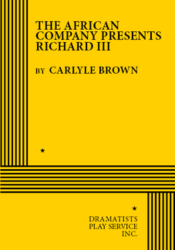
THE STORY: Earning their bread with satires of white high society, the African Company came to be known for debunking the sacred status of the English classics (which many politically and racially motivated critics said were beyond the scope of black actors). Inside the Company’s ranks, similar debates raged about whether to mimic the English tongue, or to provide a more lively interpretation of white theater by acknowledging the vibrancy of the black experience (in the words of the African Company’s manager: “Say ya Shakespeare like ya want"). Shakespeare is the chosen cultural battleground in this inventive retelling of a little known, yet pivotal event in the African Company’s history. Knowing they are always under prejudicial pressures from white society, and facing their own internal shakeups, the African Company battles for time, space, audiences and togetherness. Their competition, Stephen Price, an uptown, Broadway-type impresario, is producing Richard III at the same time as the African Company’s production is in full swing. Price has promised a famous English actor overflowing audiences if he plays Richard in Price’s theatre. Fearing the competition of the African Company’s production, which is garnering large white audiences, Price manipulates the law and closes down the theatre. The Company rebounds and finds a space right next door to Price’s theatre. At the rise of curtain of the next performance, Price causes the arrest of some of the actors in a trumped-up riot charge. The play ends with the Company, surviving, its integrity intact, and about to launch an equally progressive new chapter in the American theatre: They’ll soon be producing the first black plays written by black Americans of their day.
In 1821, forty years before Lincoln ended slavery, and fifty years before black Americans earned the right to vote, the first black theatrical group in the country, the African Company of New York, was putting on plays in a downtown Manhattan theatre to which both black and white audiences flocked. Yet the drama of this progressive group reached further than their stage.
“…the personal and the historical, the comic and the angry propels THE AFRICAN COMPANY…theatrical and social concerns entwine with powerful resonances to today…Mr. Brown is a writer with a distinct voice and a powerful story to tell.” —Washington Post.
“What makes THE AFRICAN COMPANY…so effective is the way in which the playwright not only suggests the New York of 1821, and the particular circumstances of “freed” blacks in that era, but even…suggests their angers, concerns and tensions.” —New York Post.
